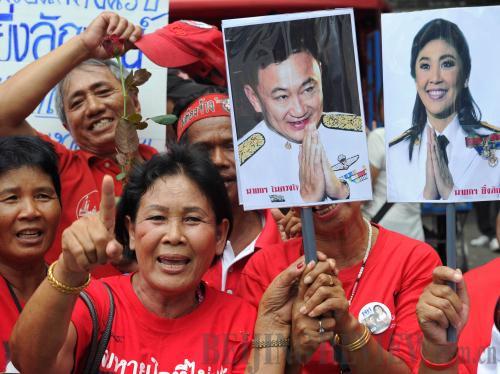|
 |
|
POPULAR SUPPORT: "Red shirt" demonstrators hold up pictures of Thailand's former Prime Minister Thaksin Shinawatra and Prime Minister Yingluck Shinawatra as they gathered in support of Yingluck in Bangkok on August 5 (XINHUA/AFP) |

Yingluck Shinawatra, whose Pheu Thai Party won 265 seats in the 500-member lower house of Thailand's parliament in the July 3 elections, was endorsed by the country's king as its first female prime minister on August 10.
The success of this former businesswoman marks a major victory for Thailand's grassroots, or rural majority who supported both Yingluck and her brother, exiled former Prime Minister Thaksin Shinawatra. Despite her landslide victory, a number of challenges await this Southeast Asian kingdom's new prime minister.
Grassroots power
During the election campaign, Yingluck proved herself to be a charismatic political leader. But the major factor behind her victory remains her family name—Shinawatra. In other words, her victory was actually the victory of her brother Thaksin.
Thailand's politics has traditionally been dominated by a small group of elites. Thai society remains hierarchal and this hierarchy has led to serious imbalances in the distribution of resources and privileges. As a result, the country suffers from a widening wealth divide, which has only further strengthened the existing hierarchy.
While Thailand's middle class has grown significantly, the middle-class population is not large enough to break the elites' stranglehold on politics. Only the country's rural grassroots majority has the numerical strength to upset the established political order.
Thai politicians, however, used to focus their campaigns on the country's cities. As rural residents were traditionally not engaged in politics, they had little interest in the election process and their votes were often bought by elite candidates. This focus on urban areas has created a growing gap in economic conditions between Thailand's modern cities and its less developed countryside.
Thaksin was the first mainstream Thai politician to see the potential of a grassroots power base. In the 2001 elections, he put forward measures to promote rural development. After elected, he implemented successful agricultural policies. These policies brought tangible benefits to farmers and thus won sincere support for him.
Thaksin inspired Thai farmers to participate in political affairs and fight for their rights. Thanks to his initiatives, Thailand's grassroots majority effectively entered the political arena.
The power of the grassroots is not only evident from the landslide election victories achieved by Thaksin in 2001 and 2005, but also clear from persistent protests staged by his supporters, known as "red shirts," following his exile. Notably, after Thaksin was deposed following a military coup in 2006, his ally, Samak Sundaravej, still secured victory in the 2007 elections. Yingluck's victory this time is further proof of grassroots' power.
| 